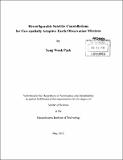Reconfigurable satellite constellations for geo-spatially adaptive Earth observation missions
Author(s)
Paek, Sung Wook
DownloadFull printable version (21.78Mb)
Other Contributors
Massachusetts Institute of Technology. Dept. of Aeronautics and Astronautics.
Advisor
Olivier L. de Weck.
Terms of use
Metadata
Show full item recordAbstract
Continuously increasing demand for Earth observation in atmospheric research, disaster monitoring, and intelligence, surveillance and reconnaissance (ISR) has been met by responsive architectures such as unmanned aerial systems (UAS) or artificial satellites. Space-based architectures can provide non-dominated design solutions on the utility-cost curve compared to alternate architectures through the use of two approaches: (1) reducing satellite manufacturing and launch costs and (2) introducing reconfigurability to the satellite constellations. Reconfigurable constellations (ReCons) enable fast responses to access targets of interest while providing global monitoring capability from space. The wide-area coverage and fast responses provided ReCon can complement high-resolution imagery provided by UAS. A newly proposed ReCon framework improves the model fidelity of previous approaches by utilizing Satellite Tool Kit (STK) simulations and Earth observation mission databases. This thesis investigates the design and optimization of ReCon in low Earth orbits. A multidisciplinary simulation model is developed, to which optimization techniques are applied for both single-objective and multi-objective problems. In addition to the optimized baseline ReCon design, its variants are also considered as case studies. Future work will potentially co-optimize ReCon and UAS-like systems.
Description
Thesis (S.M.)--Massachusetts Institute of Technology, Dept. of Aeronautics and Astronautics, 2012. Cataloged from PDF version of thesis. Includes bibliographical references (p. 145-151).
Date issued
2012Department
Massachusetts Institute of Technology. Department of Aeronautics and AstronauticsPublisher
Massachusetts Institute of Technology
Keywords
Aeronautics and Astronautics.